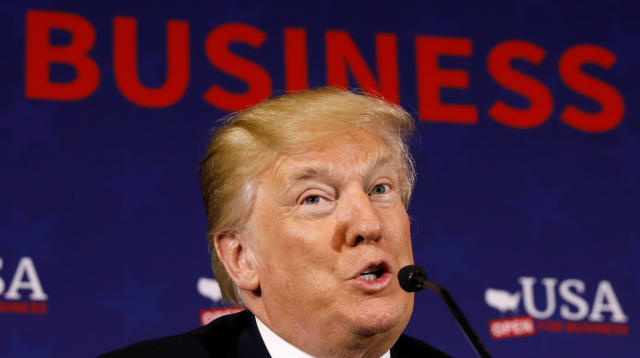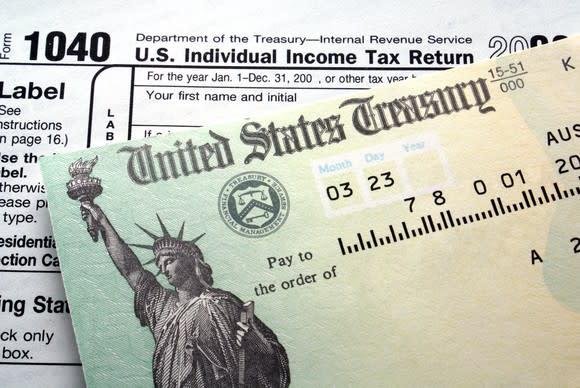Trump's Retail Website Only Pays Sales Taxes In 2 States. Amazon Pays Taxes In 45.
 Mary Papenfuss,HuffPost 22 hours ago
Mary Papenfuss,HuffPost 22 hours ago

President Donald Trump has railed against Amazon, falsely claiming the company fails to pay state and local sales taxes on online shipments. But it turns out the Trump Organization retail website collects sales taxes only on goods shipped to two states — while Amazon collects sales taxes in 45 states.
The TrumpStore.com website sells Trump-labeled glassware, baseball caps, luggage tags, spa slippers and key chains, among several other items. It collects sales tax only on orders shipped to buyers in Florida and Louisiana, according to the company’s own website, The Wall Street Journal was the first to point out on Friday.
TrumpStore.com, which touts itself as the “official retail website of the The Trump Organization,” doesn’t even pay sales taxes on its online shipments in New York, according to the information on its site. Its physical store and headquarters are located in the Trump Tower in Manhattan.
Trump, who maintains his ownership of the Trump Organization even while president, has been slamming Amazon on Twitter for dodging sales taxes. He has called it a “no-tax” company and has blasted Amazon for paying “little or no taxes to state & local governments.”
According to regulatory filings, Amazon paid a combined total of $412 million in federal, state, local and foreign taxes last year. In 2015, it paid $273 million. Amazon currently charges consumers sales taxes in all 45 states where such taxes exist, plus Washington, D.C. All states except Alaska, Delaware, Montana, New Hampshire and Oregon collect sales tax.
Amazon doesn’t have to pay all those taxes. A 1992 Supreme Court ruling effectively restricts states from forcing online retailers to pay state and local sales taxes if the company has no physical presence or employees in the state.
Amazon reportedly also supports legislation that would require all online retail operations — such as TrumpStore.com — to pay local taxes so companies operate on a level competitive playing field.
It’s impossible to know what state and local taxes the TrumpStore has paid because it’s a private company and Trump has not released any tax information.
“Trumpstore.com has always, and will continue to collect, report, and remit sales taxes in jurisdictions where it has an obligation to do so,” a spokeswoman told The Wall Street Journal.
A “terms and conditions” section of Trump’s online store informs consumers that they’re responsible for paying any applicable tax on merchandise they purchase.
TrumpStore.com could soon be forced to catch up to Amazon on state sales taxes, thanks to the president. The Trump administration last month filed a brief with the U.S. Supreme Court urging it to allow states to require that online retailers collect and pay sales taxes even where they have no physical presence.
Video: Are the President's Claims About Amazon True?
For more news videos visit Yahoo View.
- This article originally appeared on HuffPost.
- Above is from: https://www.yahoo.com/news/trump-apos-retail-website-only-031557195.html
Motley Fool
Trump Is Right. Amazon Is a Master of Tax Avoidance
 Jeremy Bowman, The Motley Fool,Motley Fool 12 hours ago
Jeremy Bowman, The Motley Fool,Motley Fool 12 hours ago
Image source: Getty Images.
The sales tax game
Laws are often slow to evolve to respond to technological advances. Municipalities continue to struggle with "sharing economy" companies like Airbnb and Uber, and cryptocurrencies have similarly been a challenge for regulators.
In its rise to retail dominance, Amazon also exploited this regulatory delay. In the pre-internet era, sales taxes, which are imposed by states and municipalities, were only assessed if a retailer had a physical presence inside that domain. For most of its history, Amazon avoided charging sales tax on most of its customers by shipping goods from the few low-population states where it had warehouses. That strategy gave Amazon an unfair advantage and deprived states and municipalities of revenue they would have normally collected. The National Bureau of Economic Research estimated that Amazon's sales fell by nearly 10% when that tax advantage disappeared.
When that strategy no longer became tenable, and as Amazon wanted to add more warehouses in more states to support its growing Prime two-day delivery program, the company often negotiated to get the taxes delayed, deferred, or reduced as a condition of collecting them. Even today, Amazon's third-party sellers, a significant portion of its business, often don't collect sales taxes, and Amazon itself doesn't always collect local sales taxes.
The HQ2 bonanza
Companies often pit states against each other in order to get the best tax incentive package available, but Amazon took this tax avoidance strategy to a new level with its search for a second headquarters. The company solicited bids from cities and regions interested in hosting its second headquarters, promising $5 billion in investment and 50,000 new jobs over the next decade. Amazon received over 200 bids with offers as lucrative as $7 billion in tax incentives from Newark, and Chicago offered to let Amazon keep over $1 billion in income taxes that would normally go to the state. Again, this method is not unique. Foxconn just squeezed billions of dollars in incentives out of Wisconsin for locating a new plant there, but Amazon's size gives it undue sway in easing its tax burdens and tilting the playing field. Its strategy with the Post Office has been similar, as it's scored perks like Sunday delivery and lower rates that would not be available to a smaller company.
The long-term strategy
Throughout its history, Amazon has consistently reported minimal profits, meaning it has paid very little in taxes since taxes are assessed based on profits. While that strategy is generally seen as sacrificing profits for market share and long-term competitive advantages, it's also a way of avoiding taxes, especially compared to its rivals, who pay some of the highest tax rates in business. Between 2008 and September 2017, for example, Walmart (NYSE: WMT) paid $64 billion in income tax, compared to just $1.4 billion for Amazon, even though Amazon has been the more valuable company for several years now.
Avoiding taxes is standard practice for businesses, but few companies have benefited from exploiting the system more than Amazon, and those strategies have given the e-commerce leader a decided advantage over its heavily taxed retail rivals.
There's no question that Amazon has weighed on the profit growth of its retail peers. By avoiding its own taxes and lowering industry profits, the company is reducing the broader retail corporate tax base. It's not surprising that such an issue would attract government attention.
John Mackey, CEO of Whole Foods Market, an Amazon subsidiary, is a member of The Motley Fool's board of directors. Jeremy Bowman owns shares of Apple. The Motley Fool owns shares of and recommends Amazon and Apple. The Motley Fool has the following options: long January 2020 $150 calls on Apple and short January 2020 $155 calls on Apple. The Motley Fool has a disclosure policy.Above is from: https://www.yahoo.com/finance/news/trump-amazon-master-tax-avoidance-131600217.html

No comments:
Post a Comment